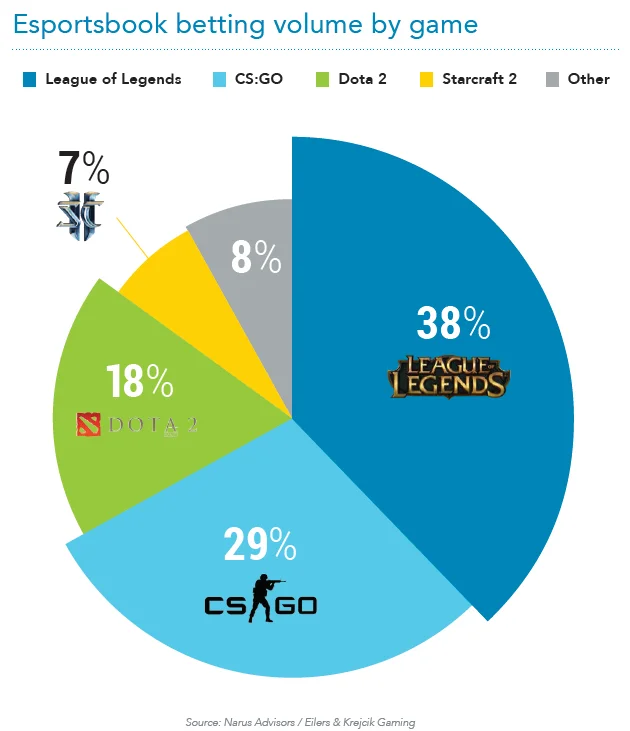Gambling on – and around – esports is a much bigger market than many assume.
The market can basically be divided by product and then by currency. Let’s start by talking a bit about the currencies that underpin gambling on esports.
Esports gambling: Popular currencies
For esports gamblers, the currency choice comes down to a decision between cash and skins (virtual items from video games).
Daily Fantasy Esports in the US
Cash requires little explanation. The market for cash gambling on esports works identically to the cash-based market for traditional online wagering, such as sports betting or online casino games.
Skin betting on esports
Skins require a bit more explanation. Skins are virtual items that can be used in games like Counter-Strike: Global Offensive (CS:GO). The term “skin” is derived from the typical function of these virtual items: changing the appearance of a player’s in-game avatar, weapons, or equipment.
While a number of games employ some sort of skin system, CS:GO skins are the dominant currency in the skin betting market, accounting for over 80 percent of total wagering activity.
For example: Below is an image of the “stock” knife used as a weapon in CS:GO. Players can opt to replace that stock knife with unique skins of the knife that change the appearance of the knife, as shown in the images to the right of the stock knife.

Note that the skins do not improve the functionality or power of the knife. The skin only changes the appearance of the knife. Skins play a purely cosmetic role.
CS:GO skins can be easily transferred between players (the same is not true for all games). That condition allows skins to act as a quasi-currency – something like a casino chip. Given that ability to move skins between players, layering a gambling site on top of that ability is a relatively easy task.
Here’s how it works:
- Players “deposit” a skin at a skin betting site (popular types of sites include sportsbooks, lotteries, roulette, and coin flips) by transferring the skin to the skin betting site.
- They gamble using their deposited skins (or in some sort of internal currency that the player receives in exchange for their skin).
- If they win, they’re paid in additional skins, which they “cash out” by requesting that the skin betting site transfer skins back to the player.
Once players have skins in their Steam account, they can:
- Leave the skins dormant in their inventory.
- Use the skins to change the appearance of their weapons.
- Trade skins with other players.
- Sell skins on the Steam marketplace for Steam credit (not cash) that can be used to buy other skins and games via Steam.
- Exchange skins for cash on third-party sites outside of Steam.
Right now, skin gambling is far more popular than cash betting, but a crackdown on skin gambling activity by CS:GO publisher Valve could fundamentally undermine the ability of skin gambling sites to operate.
Esports gambling: Popular games
A few basic types of gambling dominate the esports gambling market.
Sports betting
Sports betting represents the most popular product among esports fans. Betting on esports is more or less identical to betting on traditional sports, with the caveat that the esports betting product is far less developed than the traditional sports betting product.
Players can choose between cash-based or skins-based sites when betting on esports matches.
In terms of popular games, as the chart below suggests, real-money League of Legends betting leads the pack, but CS:GO betting is a close second (and closing ground, according to our analysis):

Fantasy esports
While markedly smaller than sports betting on esports matches, there is nonetheless a demand for fantasy esports.
Most of the sites serving this space deal in cash betting. The major players are just who you’d expect when thinking about daily fantasy sports; you’ll find fantasy esports at DraftKings.
The basics of daily fantasy eSports
Fantasy eSports sites offer some variant of the “salary cap” model, in which users select a roster of players for their fantasy team under the restrictions of a salary cap set by the site. After picking a team, the eSports competitors score fantasy points for users based on their performances in competition. The users that end a contest with the most fantasy points win cash prizes.
The types of contests offered in fantasy eSports generally mirror those of traditional fantasy sports:
- Guaranteed contests (top entries receive part of a guaranteed prize pool)
- Head-to-head matches
- Winner-take-all contests
- 50-50 contests (contests where half the field is paid)
- Double- or triple-up contests, where players win 2x or 3x their buy-in
- Qualifiers for other contests
- “Leagues” (any contest that is not guaranteed, but is not a two-player contest)
Contests are available across the three sites on a variety of popular competitive video games:
- League of Legends
- Dota 2
- Counter-Strike: Global Offensive (csgo)
- Hearthstone: Heroes of Warcraft
- Call of Duty
- SMITE
Jackpot games
Jackpot games are basically lottery-style games that allow players to risk a small amount for a chance at a large payday.
Right now, jackpot games are only available at skin betting sites, but it makes sense that cash betting sites would start to offer some equivalent product in an attempt to attract skin gamblers – especially if Valve’s crackdown succeeds in choking off the skin betting market/
As the chart below shows, jackpot games formed the second-most popular segment of skin betting activity after sports betting (note that estimates are prior to Valve’s crackdown).

Casino-style games
A handful of casino-style games (including roulette, blackjack, and raffles) make up the majority of the remaining interest in gambling among esports fans.
Again, these games (at least within an esports-dominated frame) are only available at skin betting sites. The market for these (and all) skin betting products is in flux following Valve’s decision to crack down on the activity.
Other article:
